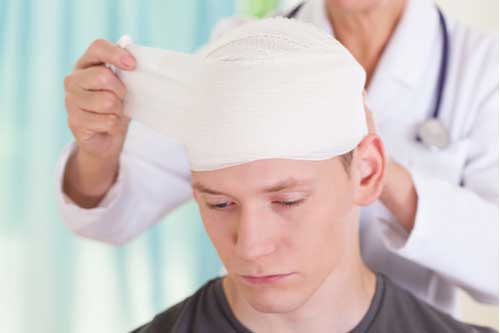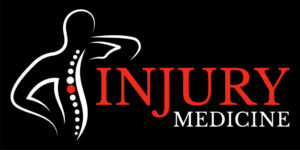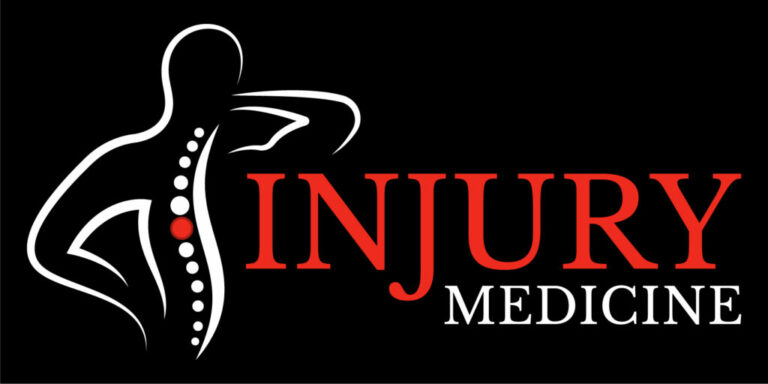- Brain Injury
A brain injury, even if not fatal, can lead to long-term problems if it is not treated promptly. Common causes of brain injuries include car accidents and serious falls. Any head injury should be seen as a potential medical emergency (even if it does not seem serious).
At Injury Medicine, we understand the importance of timely medical treatment for a brain injury. Our Anderson injury center staff helps individuals avoid complications from a brain injury and put them on the track to recovery.
What Is a Brain Injury?
A brain injury is defined as any damage to the brain that causes changes in how it functions. This can range from a mild form of brain injury called a concussion to a more severe traumatic brain injury (TBI). TBI can cause long-term or permanent changes in a person’s cognitive, physical, and personality abilities.
Get medical assistance immediately if you feel you or someone else has suffered a head injury. Brain injuries are difficult to identify since they may not usually appear on routine testing such as X-rays or CT scans. A competent physician can decide whether there is evidence of brain damage and, if so, arrange further tests.
Even if the brain injury appears minimal, you must seek medical attention as soon as possible. Certain brain injuries worsen over time and may need therapy to avoid additional injury.
Symptoms of a Brain Injury
The symptoms of a brain injury can be severe, even fatal – if you notice one or more of these, get properly diagnosed by a medical expert:
- Headaches
- Dizziness
- Nausea
- Vomiting
- Fatigue
- Confusion
- Memory loss
- Sleepiness
- Difficulty concentrating
- Mood swings
- Depression
- Anxiety
- Seizures
How Is a Brain Injury Diagnosed?
A brain injury can be diagnosed in different ways, depending on the degree of damage. For a moderate brain injury, such as a concussion, a medical professional will only speak with the victim and inquire about their symptoms.
More severe brain injuries will demand further testing, such as CT or MRI scans.
In some situations, a neuropsychological evaluation may be necessary to diagnose brain damage.
The Glasgow Coma Scale (GCS) is frequently used to evaluate brain injuries. This scale of 3 to 15 determines the severity of your head injury based on your symptoms and whether or not the brain has been injured:
- 3 is considered the most severe and 15 the least severe
- A GCS of 13 or above indicates a mild brain injury
- A brain injury with a score of 9 to 12 is considered moderate.
- A person with a significant head injury will have a score of 8 or less
Sometimes, people start with a high GCS score, but their score drops when they are reviewed later.
Treatment for a Brain Injury
Brain injuries range from minor concussions to serious traumatic brain injuries (TBIs) – the degree of the damage will determine the treatment plan.
Mild injuries
For milder concussions, rest and plenty of water are typically recommended. Mild traumatic brain injuries usually do not require treatment beyond rest and over-the-counter pain medications to manage a headache.
On the other hand, a person with a moderate traumatic brain injury should be continuously followed at home for any persisting, worsening, or new symptoms.
The doctor will determine whether returning to work, school, or leisure activities is safe.
Reducing physical or mental (cognitive) activities is typically suggested for the first few days or until your doctor says it’s safe to resume routine activities.
Serious Brain Injuries
Traumatic brain injuries may demand hospitalization and extended therapy. In certain cases, surgery may be necessary to remove blood clots or repair damaged tissue.
Such individuals may also have suffered additional injuries. Further treatment options at a hospital’s emergency department or intensive care unit will concentrate on reducing any extra harm brought on by inflammation, bleeding, or a lack of oxygen to the brain.
Rehabilitation
Rehabilitation is an integral part of treating any brain injury, regardless of severity. Physical, occupational, and speech therapy can help patients regain lost abilities and develop new coping strategies for any remaining physical or cognitive impairments.
Typically, therapy begins in the hospital and continues in an inpatient rehabilitation center, a residential treatment facility, or through outpatient treatments. The method and duration of rehabilitation vary depending on the degree of the brain damage and the area of the brain harmed.
Long-Term Effects of a Brain Injury
When a person has a brain injury, the consequences can be long-lasting and possibly crippling. Timely medical attention is required to reduce the danger of future harm and guarantee that the individual receives the best care.
An individual may feel confusion, disorientation, and headaches in the early following. Seizures, loss of consciousness, or coma may also occur.
Long-term brain injuries can cause cognitive, memory, communication, and emotional or behavioral abnormalities.
Physical consequences, such as weakness or paralysis on one side of the body, may also persist. Brain injuries may have a dramatic and long-lasting influence on a person’s life and the lives of their loved ones.
Why Do You Need Immediate Medical Attention?
Brain injuries can happen from various causes, including automobile accidents, falls, or sports injuries. When the head is struck, the brain might be harmed. This injury can result in bleeding, swelling, and other complications.
A brain injury can result in long-term complications or even death if not treated immediately. That is why it is critical to seek medical attention after suffering a head injury as soon as possible.
It is clear from the preceding discussion that immediate medical intervention is required in the event of brain damage. When left untreated, brain injuries can have serious long-term consequences, making it critical to seek medical attention as soon as possible.
Get Treatment at Our Anderson Injury Clinic!
If you, or a loved one, have suffered a brain injury, you may feel overwhelmed and unsure where to seek help. In such cases, you can count on Injury Medicine.
At our Anderson injury clinic, we help people recover from brain injuries with physical therapy and neurology services.
Contact us today to learn more about how we can help you!





